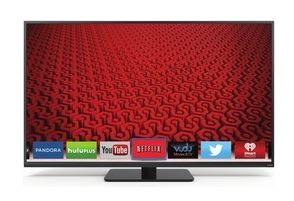Vizio Settles With FTC For $2.2 Million Over TV Snooping Claims
Apparently you can't even trust your TV not to spy on you anymore. The Federal Trade Commission (FTC) announced that Vizio will pay $2.2 million to settle charges that it "installed software on its TVs to collect viewing data on 11 million consumer TVs without consumers’ knowledge or consent."
The FTC, along with New Jersey's attorney general and Department of Consumer Affairs, previously said that Vizio started to sell TVs with tracking software enabled by default in February 2014. The company was also alleged to have updated older TVs with this tracking software at the same time. At no point were people made aware of the inclusion of this software in new TVs, and older TVs showed a vague message that offered little information.
Here's how the agencies described the software's capabilities in their complaint:
Through the ACR software, VIZIO’s televisions transmit information about what a consumer is watching on a second-by-second basis. Defendants’ ACR software captures information about a selection of pixels on the screen and sends that data to VIZIO servers, where it is uniquely matched to a database of publicly available television, movie, and commercial content. Defendants collect viewing data from cable or broadband service providers, set-top boxes, external streaming devices, DVD players, and over-the-air broadcasts. Defendants have stated that the ACR software captures up to 100 billion data points each day from more than 10 million VIZIO televisions. Defendants store this data indefinitely.
Vizio was also said to be able to gather "IP address, wired and wireless MAC addresses, WiFi signal strength, nearby WiFi access points, and other items" using this software. "In addition, VIZIO facilitated appending specific demographic information to the viewing data, such as sex, age, income, marital status, household size, education level, home ownership, and household value," the FTC said in its settlement announcement. Vizio sold this data.
The data was then used to figure out what people watch, determine if ads were effective by seeing if commercials resulted in website visits from the same IP address, or target ads displayed on other devices based on someone's TV habits. People could turn off this data collection, which would prevent Vizio from sharing personal information with other companies, but the agencies said Vizio's messages didn't make it easy for consumers to do that.
The FTC said Vizio's actions were "unfair and deceptive" and "in violation of the FTC Act and New Jersey consumer protection laws." The commission will receive $1.5 million from Vizio, which will also give $700,000 to New Jersey's Department of Consumer Affairs, as part of the settlement agreement.
Get Tom's Hardware's best news and in-depth reviews, straight to your inbox.

Nathaniel Mott is a freelance news and features writer for Tom's Hardware US, covering breaking news, security, and the silliest aspects of the tech industry.
-
TMTOWTSAC Here's the part of the settlement that caught my attention:Reply
"The stipulated federal court order requires VIZIO to prominently disclose and obtain affirmative express consent for its data collection and sharing practices, and prohibits misrepresentations about the privacy, security, or confidentiality of consumer information they collect."
So it isn't just disclosure, they're actually forced to make the snooping opt-in rather than opt-out. That's a big shift in policy. Let's hope other companies start being held to it as well. -
MCMunroe That method of matching content to a sample of the image is interesting. It would match and sample an episode of Family Guy being played from a computer.Reply
That method really does cover most media devices. -
LeeRains As if I needed another reason not to buy a Vizio TV... Well, now Vizio goes on my permanent black list.Reply -
Hanin33 @LEERAINS the problem is that this isn't unique to Vizio as i remember LG doing something similar recently... i guess in the end, we just have to be more aware that new technology is more likely to be snooping on us as well as doing wotever it was intended to do...Reply -
velocityg4 So they got a fine of $0.22 per TV this was installed on. I'd say they got a slap on the wrist. But that would be an overstatement. A flick on the wrist is apt.Reply
I wonder how much they made off the data from content providers?
